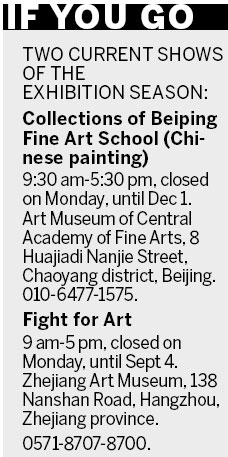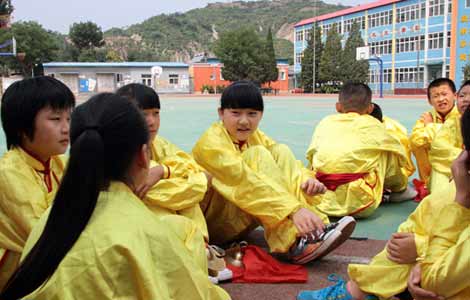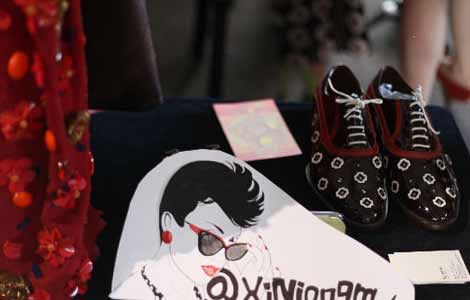Museum collections emerge from storage
Updated: 2013-08-30 07:17
By Lin Qi (China Daily)
|
|||||||||||
The National Art Museum of China is receiving a growing number of visitors this summer, more than 4,000 on an average daily basis and 7,000 on weekends. It also feels a stronger-than-ever desire of patrons to see its immense collections.
"We regularly conduct surveys among visitors, and over the past two years, we've sensed people's growing desires to view our collections, especially the most representative and classic works," says NAMOC's director Fan Di'an.
The museum doesn't have space for permanent displays of collected works. It shows some in special exhibitions every year, but this represents only a small fraction of the 110,000 items in storage, a collection that keeps increasing.
To make art held by public museums like NAMOC more accessible, the Ministry of Culture recently launched the second "National Exhibition Season of Brilliant Collection Works from Chinese Art Museums". Thirty museums are holding or will hold exhibitions to present a total of nearly 3,200 artworks from their storehouses, about 60 percent of which are making their debut for public viewing, from August to November.
"Participating museums show a wide range of public fine art resources from State- and provincial-levels such as NAMOC, to city- and county-levels such as Changshu Art Museum; and of both museums affiliated to fine art colleges and galleries in commemoration of celebrated artists," says Vice-Minister of Culture Dong Wei.
He says the first exhibition season involved 28 public museums that displayed more than 3,900 artworks, which attracted a total of 1.7 million visitors during the same period last year.

NAMOC director Fan says the season will further boost private donations to public institutions, and inspire museums to study their collections thoroughly. The museum will hold a Going to the West exhibition in November, displaying artworks created in the 1940s from its collections.
"There is no end to collecting. Museums need to focus on artworks that associate with the regional culture, to enliven them and to make them tell stories that viewers will feel attached to," he says.
Beijing Fine Art Academy's art museum is one such venue, curating exhibitions that resound with the local community. Its current show juxtaposes Chinese paintings by two gongbi masters - Yu Fei'an, a Beijing native, and Chen Zhifo - which come from its own collection and on loan from the Nanjing Museum.
The museum was built on a rich collection of artworks, seals, letters and other memorabilia of Qi Baishi (1864-1957). Qi lived in Beijing for the last 37 years of his life and was the academy's honorary president. The museum turns its third and fourth floors into a memorial gallery of Qi's legacies, and museum curator Wu Hongliang says the permanent displays will change every six or 12 months. "While on the first and second floors, we will continue to curate exhibitions of Chinese painting masters of the 20th century," he says.
Those who are unable to go to the museums can also visit the institutions' websites to catch up with the exhibitions. For instance, China Art Museum Shanghai will launch its digital museum, providing an all-round virtual visiting experience, on Oct 1 to celebrate its one-year anniversary. Beijing Fine Art Academy's museum will soon open a WeChat account.
The exhibition season will be followed by a nationwide census of public museums' collections, says Dong the vice-minister, which will encourage more museums to make better use of their inventories and plan academic research well.
linqi@chinadaily.com.cn
(China Daily 08/30/2013 page20)
Today's Top News
Oil giants fail environmental tests
Weak M&A activity forecast until policy outlook clears
Geely becomes China's top automobile exporter
Solar panel maker hits milestone
UK parliament votes no on Syria strike
Visa issues resolved in new policy
Russia to rotate in Mediterranean
Disputes should not affects interests
Hot Topics
Lunar probe , China growth forecasts, Emission rules get tougher, China seen through 'colored lens', International board,
Editor's Picks

|

|

|

|

|

|





